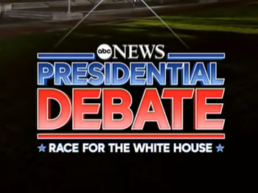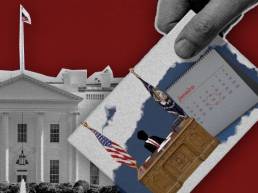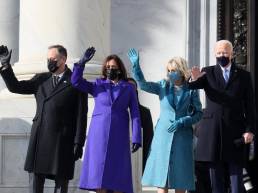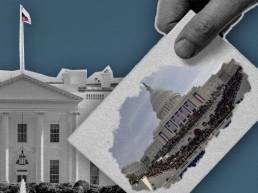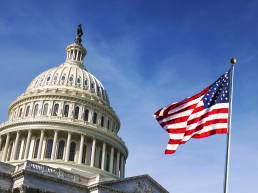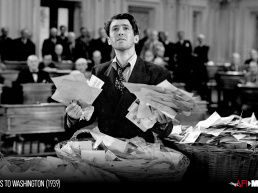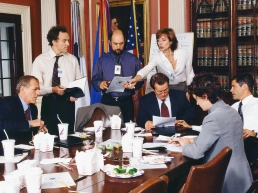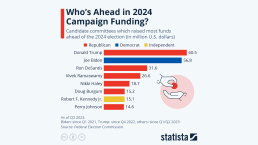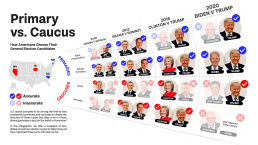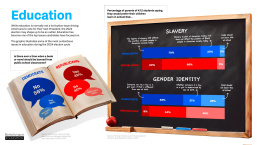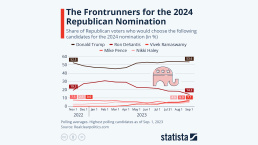Special Elections 2024
00 days 00 hours 00 minutes 00 seconds
October 16, 2024
Anne-Marie Slaugther: “in a time of polarization it’s really hard to be a moderate”
Optimistic about the results in Germany, France and India, he says that it will be in the US that we will see if 2024 is a good year for democracy.
October 3, 2024
‘2024: The Year of Democracy?’ with Anne-Marie Slaughter – October 15 at 6:30 pm
CEO of the think tank New America is the second guest of FLAD's cycle on the 2024…
September 24, 2024
Now available: ‘O Burro e o Elefante’ podcast first episode
'O Burro e o Elefante' is the new podcast from FLAD and Expresso dedicated to…
September 24, 2024
‘Até à Casa Branca´: new US election 2024 special newsletter Observador/FLAD
Until the elections, the Observador newsletter supported by FLAD will analyze the…
September 24, 2024
Kamala Harris and Donald Trump face off in first debate
Presidential candidates debated for the first time. Debate was promoted and…
How does the Electoral College Work?
North-Americans return to the polls on November 3rd to choose the next President for the next four years. Donald Trump is the candidate for re-election representing the Republican Party and is expected to be opposed by the Democratic Party either by Vermont Senator, Bernie Sanders, or by the former Vice-President Joe Biden. Voters choose the President indirectly, through the election of the delegates that make up the Electoral College. To win, either candidate must get at least 270 delegates.
January 25, 2021
Observador Newsletter: What can a President do in it’s first hour in office? Interview with Jim Costa
The power and limitations of governing by executive order in the United States and…
January 21, 2021
‘América Vinte Vinte’: Biden’s inaugural adress and first decisions
This week, Nuno Severiano Teixeira, Professor and Director of IPRI-NOVA, analyzes…
January 18, 2021
Observador Newsletter: Why does the inauguration matter?
The importance of the new president's inauguration speech. And yet, an interview…
January 14, 2021
‘América Vinte Vinte’: Trump’s second impeachment and Biden’s start
This week, Professor Teresa Botelho and Political Consultant Lee Neves analyze…
Conferences
Chronology
Day 3 — Iowa Caucus
It is at the National Convention of the Republican Party that the candidates for President and Vice President of the United States will be nominated by this party.
Caucuses take place every four years, after the caucuses, in which delegates are allocated to each candidate based on the votes. They will then vote for the presidential candidate during the convention.
This year, the Republican convention will be held in Milwaukee, Wisconsin, July 15-18.
Day 11 and 22 — Democratic primaries in New Hampshire and Nevada
February seemed to be Bernie Sanders’ month. After nearly tying with Pete Buttigieg in Iowa, where he even won the popular vote, Bernie Sanders won prominently in New Hampshire and Nevada, where he had the opposition (not formalized) of the powerful union representing the workers of the Hospitality sector.
Day 29 — Democratic primary in South Carolina
After very positive results in the first three primaries, Bernie Sanders’ campaign was gaining momentum when Joe Biden did what he always said he would do – win South Carolina by attracting the Afro-American vote. The Vice-President won with more than twice the votes of the runner-up.
*In the Republican Party primary elections are also taking place, but the only candidate is Donald Trump, common in cases where presidents seek re-election for a second term.
Day 3 — Super Tuesday
This Tuesday is Super because it’s the day during the primaries when more states go to the polls (14, among them California and Texas) and where the candidates can obtain about 1/3 of the delegates in the entire race. It was on Super Tuesday that Joe Biden demonstrated that he has the capacity to become the Democratic nominee, winning in 10 of the 14 states. The rest were won by Bernie Sanders, the favorite before the poll.
Day 4 — Mike Bloomberg drops out and announces support for Joe Biden
Elizabeth Warren Drops Out of Her Presidential Campaign, Announces No Support for Any Candidate (Day 5)
Day 10 — Big Tuesday
Joe Biden has another standout victory over Bernie Sanders, beating Idaho, Michigan, Mississippi and Missouri. Washington is divided. Sanders wins only in North Dakota.
Democratic primaries in Arizona, Florida, Illinois, and Ohio (17th)
Two of the major swing states go to the democratic primary, Florida, and Ohio. The results in Florida are especially important to assess which of the candidates has the most receptivity within the Latin-American community.
*In the Republican Party primary elections are also taking place, but the only candidate is Donald Trump, common in cases where presidents seek re-election for a second term.
Bernie Sanders suspends campaign (the 8th)
The Vermont senator drops out of the primary campaign, admitting that he would hardly beat Joe Biden, whose campaign gained momentum after the vote in South Carolina. Sanders says, however, that he will keep his name on the ballot to win as many delegates as possible and thus influence the Democratic platform that will come out of the convention.
Bernie Sanders announces support for Joe Biden (the 13th)
In an announcement made by livestream, due to the evolution of the COVID-19 pandemic in the United States, the senator from Vermont dispels any doubt that he could be left out of the election campaign. Bernie Sanders encouraged his voters to vote for Joe Biden.
Joe Biden begins search for his vice president (the 30th)
With the nomination all but assured, Joe Biden begins his search for his running mate against Donald Trump and Mike Pence. The first criterion is that a woman must be chosen. To help him in this choice, Biden chose former Senator Chris Dodd, the mayor of Los Angeles, Eric Garcetti, the former adviser to Vice President Cynthia Hogan, and Lisa Blunt Rochester, representative of Delaware, Joe Biden’s homeland.
Protests against police violence after the death of George Floyd (26th)
An African-American man dies during his arrest by police in Minneapolis. An amateur video captures the arrest and death of George Floyd at the hands of police, starting a wave of protests in the city that would spread across the country, becoming one of the hottest topics of the campaign.
Joe Biden makes first campaign action outside (day 1)
Since the beginning of the state of emergency, Joe Biden had been holding his campaign events from his home in Delaware. The death of George Floyd and the escalation in protests, bring Joe Biden to Philadelphia to discuss racial issues.
Police and National Guard remove protesters using force for Donald Trump to visit church (Day 1)
Security forces removed all demonstrators from the streets around Lafayette Square in Washington D.C. and nearby streets in what appeared to be peaceful. A short time later, Donald Trump made his way from the White House to St. John’s Episcopal Church to take a photo with a bible in his hand.
Trump formally notifies the United Nations of the U.S. withdrawal from the World Health Organization (the 7th)
After much criticism of the organization, about alleged failures in the response to the pandemic and an alleged proximity to China – whom the organization would have helped hide the pandemic -, Donald Trump formally calls for the withdrawal of the US from the multilateral organization.
Supreme Court does not deliberate on publication of Donald Trump’s tax returns (9th)
In one of the fiercest battles since the 2016 election, Donald Trump sees the Supreme Court return the issue to the higher courts, virtually guaranteeing that Donald Trump will not have to release the two tax returns before the 2020 U.S. election. The president has resisted the disclosure, arguing with an alleged U.S. tax authority audit of his tax returns.
Donald Trump replaced campaign manager (15th)
Brad Parscale, the main brains behind Donald Trump’s 2016 social media campaign, is removed from the overall leadership of the campaign and replaced by Bill Stepien.
(Tele) Democratic Party Convention (August 17-20)
After the primary process, Democrats gather to ratify (or decide) which candidate will be nominated to face Donald Trump in the next November presidential election.
Republican Party Hybrid Convention in Charlotte, North Carolina (August 24-27)
Republicans gather in Charlotte to confirm that Donald Trump will run for re-election in November. Without internal opposition, Donald Trump seeks to remain in the presidency until January 2025. The last U.S. President who failed to stand for re-election was George H. W. Bush, who lost in 1992 to Bill Clinton.
South Bend, Indiana (Day 29)*
The first head-to-head between the two presidential candidates. A little over a month ago, Donald Trump and the one who will be chosen to lead the ticket will face off in Indiana, the city led by Pete Buttigieg, one of the sensations for the Democratic side at the start of this campaign.
*To be confirmed
Salt Lake City, Utah (Day 7)*
First and only debate between the two candidates for vice-president.
Ann Arbor, Michigan (Day 15)*
For the second time, with about two weeks to go before the final vote, the candidates leading the world’s largest economy face off again in a debate.
Nashville, Tennessee (Day 22)*
The third and final debate between the two candidates for president of the United States comes just under a week beforeNorth-Americans go to the polls.
*To be confirmed
November 3rd
Election for president of the United States
Chronology
27
June
Presidential Debate: Biden vs. Biden Trump
15
July
Republican National Convention
It is at the National Convention of the Republican Party that the candidates for President and Vice President of the United States will be nominated by this party.
Caucuses take place every four years, after the caucuses, in which delegates are allocated to each candidate based on the votes. They will then vote for the presidential candidate during the convention.
This year, the Republican convention will be held in Milwaukee, Wisconsin, July 15-18.
19
August
Democratic National Convention
It is at the Democratic National Convention that the candidates for President and Vice President of the United States will be nominated by this party.
Caucuses take place every four years, after the caucuses, in which delegates are allocated to each candidate based on the votes. They will then vote for the presidential candidate during the convention.
This year, the Democratic convention will be held in Chicago, Illinois, Aug. 19-22.
10
September
Presidential Debate: Biden vs. Biden Trump
25
September
Vice-Presidential Debate
The debate between the bipartisan vice presidential candidates is scheduled for this date at Lafayette College, Pennsylvania.
05
November
Election Day
It is the day when Americans are called to the polls for the election of the next U.S. president.
2025
05
January
Certification of Results
After the presidential election and the vote of the Electors, Congress convenes, in a joint session of the two Houses (House of Representatives and Senate), and certifies the results of the elections.
Excerpt from the 12th Ammendment:
“the President of the Senate shall, in the presence of the Senate and House of Representatives, open all the certificates and the votes shall then be counted;–The person having the greatest number of votes for President, shall be the President, if such number be a majority of the whole number of Electors appointed” (https://constitution.congress.gov/constitution/amendment-12/)
20
January
Inauguration Day
Read, Watch & Listen
May 20, 2024
10 Essential Series for Anyone Who Loves Politics
From the realistic comedy of 'Yes Minister' to the political strategy lessons of…




